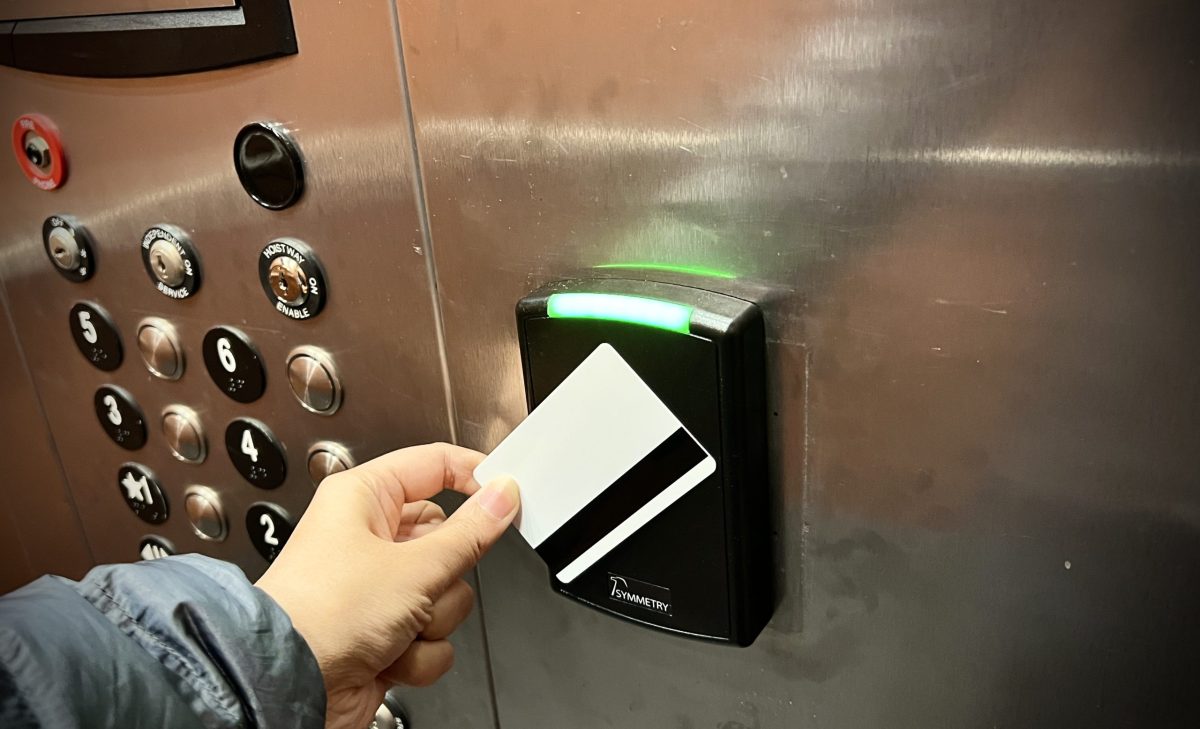(Photo by Areej Qamar)
In December 2022, several residence hall residents watched with interest as tap card readers were installed on the front of each building, replacing the preceding swipe-in system. To date, over 60% of the card readers on campus have been updated and are now tap readers. Over the next few weeks of the Spring 2023 semester, the remainder will also be changed.
Assistant Vice President of NJIT Facilities Systems Robert Gjini explained that this change was several years in the making. “Over the past four and a half years, the photo ID office has been issuing radio frequency identification cards, or RFID, to all students, faculty and staff.” As an entire undergraduate cycle has passed since the introduction of RFID, nearly every student has been issued one of these cards.
These cards contain two key components: a processor chip and an antenna, which are used for contactless communication with tap card readers. Cards should not be hole-punched, as this may accidentally damage the antenna.
As the chip is invisible, students can check if their card is RFID-enabled by observing whether the six-digit number just below their name is underlined. Those whose card numbers are not underlined can report to the photo ID office located at 131 Summit St. in order to get a free RFID card replacement.
The detailed hardware behind these high-tech additions to campus was customized to fit NJIT’s needs. On the previously existing swipe readers, Gjini commented, “Card readers are hardwired to control boards, which are connected to a server over a secure campus subnet.” This ensures security of the buildings, which was considered when upgrading the readers.
In order to upgrade to tap readers, a special communication board must be added to each control panel. Each reader port then needs to be reprogrammed to a tap reader configuration, which can read the chips within students’ and faculty members’ RFID cards. Once completed, the swipe reader is removed, and the tap reader is connected with existing wiring.
The tap reader must then be configured to work on NJIT’s unique system. The new tap reading system is undoubtedly more convenient and much faster, as identification cards can be left inside a phone wallet and pressed to the reader instead of requiring removal with the swipe cards. However, the digital nature of these tap readers generated concerns about the system’s potential to be hacked.
Gjini responded, “One of our challenges was to work with our vendor and equipment manufacturer to create a custom encryption key that is used only in NJIT tap readers. There are no other readers in the world that use our custom encryption keys. As a result, the communication between our cards and our tap readers is more secure.”
However, the ease with which students can now enter buildings using their cards is not the only new addition to the campus experience. In addition to recognizing RFID chips, the readers are also able to communicate with mobile devices utilizing Bluetooth technology. This means that future developments could include temporary access delivered over text messages or email to ensure additional convenience.
Gjini confirmed this information, stating, “As such, in the near future, we will be able to distribute unique mobile credentials so that students, faculty and staff can load an app on their cell phones that will give them authorized access to our new tap readers. We have been working with our vendor to update our head-end security system so that we will have this capability.”
Another benefit of this new system is that it may limit contact and time spent with card readers, which are high-traffic areas on campus. Given the continued presence of diseases such as COVID-19 and seasonal influenza, a potential phone-based sign-in system may limit the spread of infections.
Nearby, The Pennsylvania State University is taking the digitization trend forward. Students now have an entirely digital identification card, which they can use to pay for meals and use for laundry or vending machines in addition to accessing residence halls.
Whether NJIT will adopt such a program, in which Tech Bucks and a bank account connected to identification cards will be accessible through a smartphone, still remains to be seen. However, the NJIT Facilities Systems Department requests that students stay tuned for announcements on this new technology as the university works towards implementing, testing and releasing this mobile credential solution.


































